自考英语写作_应试技巧
- 格式:ppt
- 大小:174.50 KB
- 文档页数:58
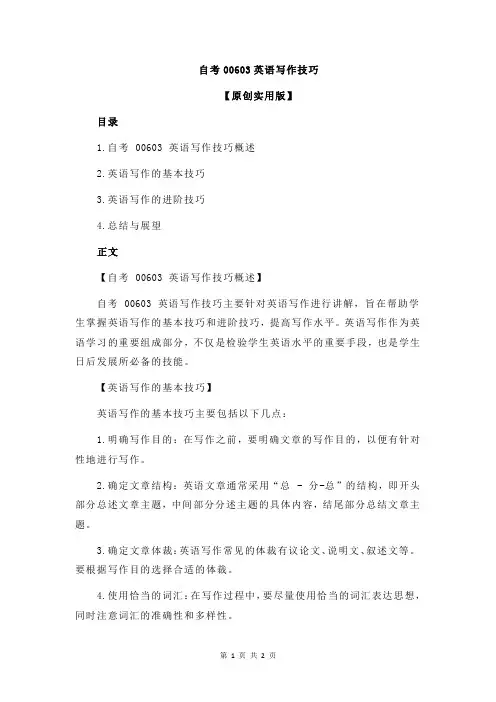
自考00603英语写作技巧【原创实用版】目录1.自考 00603 英语写作技巧概述2.英语写作的基本技巧3.英语写作的进阶技巧4.总结与展望正文【自考 00603 英语写作技巧概述】自考 00603 英语写作技巧主要针对英语写作进行讲解,旨在帮助学生掌握英语写作的基本技巧和进阶技巧,提高写作水平。
英语写作作为英语学习的重要组成部分,不仅是检验学生英语水平的重要手段,也是学生日后发展所必备的技能。
【英语写作的基本技巧】英语写作的基本技巧主要包括以下几点:1.明确写作目的:在写作之前,要明确文章的写作目的,以便有针对性地进行写作。
2.确定文章结构:英语文章通常采用“总 - 分-总”的结构,即开头部分总述文章主题,中间部分分述主题的具体内容,结尾部分总结文章主题。
3.确定文章体裁:英语写作常见的体裁有议论文、说明文、叙述文等。
要根据写作目的选择合适的体裁。
4.使用恰当的词汇:在写作过程中,要尽量使用恰当的词汇表达思想,同时注意词汇的准确性和多样性。
5.注意语法和拼写:在写作过程中,要确保语法和拼写的正确性,避免出现错误。
【英语写作的进阶技巧】英语写作的进阶技巧主要包括以下几点:1.灵活运用修辞手法:在写作过程中,可以运用比喻、拟人、排比等修辞手法,使文章更具表现力。
2.使用恰当的连接词:连接词可以使文章的句子更加连贯,提高文章的可读性。
3.注意文章的逻辑性:在写作过程中,要注意文章的逻辑性,使文章的观点更加清晰、有条理。
4.适当使用长句和短句:在写作过程中,适当使用长句和短句,可以使文章的句式更加丰富,提高文章的质量。
【总结与展望】自考 00603 英语写作技巧为学生提供了英语写作的基本技巧和进阶技巧,有助于提高学生的写作水平。
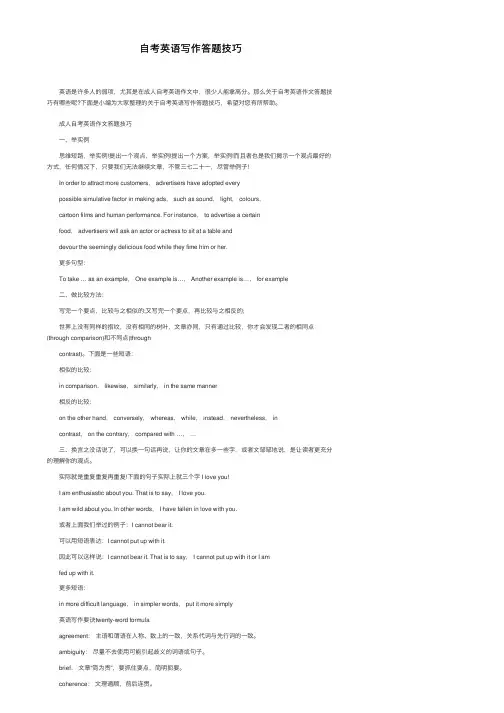
⾃考英语写作答题技巧英语是许多⼈的弱项,尤其是在成⼈⾃考英语作⽂中,很少⼈能拿⾼分。
那么关于⾃考英语作⽂答题技巧有哪些呢?下⾯是⼩编为⼤家整理的关于⾃考英语写作答题技巧,希望对您有所帮助。
成⼈⾃考英语作⽂答题技巧⼀、举实例思维短路,举实例!提出⼀个观点,举实例!提出⼀个⽅案,举实例!⽽且者也是我们揭⽰⼀个观点最好的⽅式,任何情况下,只要我们⽆法继续⽂章,不管三七⼆⼗⼀,尽管举例⼦!In order to attract more customers, advertisers have adopted everypossible simulative factor in making ads, such as sound, light, colours,cartoon films and human performance. For instance, to advertise a certainfood, advertisers will ask an actor or actress to sit at a table anddevour the seemingly delicious food while they fime him or her.更多句型:To take … as an example, One example is…, Another example is…, for example⼆、做⽐较⽅法:写完⼀个要点,⽐较与之相似的;⼜写完⼀个要点,再⽐较与之相反的;世界上没有同样的指纹,没有相同的树叶,⽂章亦同,只有通过⽐较,你才会发现⼆者的相同点(through comparison)和不同点(throughcontrast)。
下⾯是⼀些短语:相似的⽐较:in comparison, likewise, similarly, in the same manner相反的⽐较:on the other hand, conversely, whereas, while, instead, nevertheless, incontrast, on the contrary, compared with …, …三、换⾔之没话说了,可以换⼀句话再说,让你的⽂章在多⼀些字,或者⽂邹邹地说,是让读者更充分的理解你的观点。

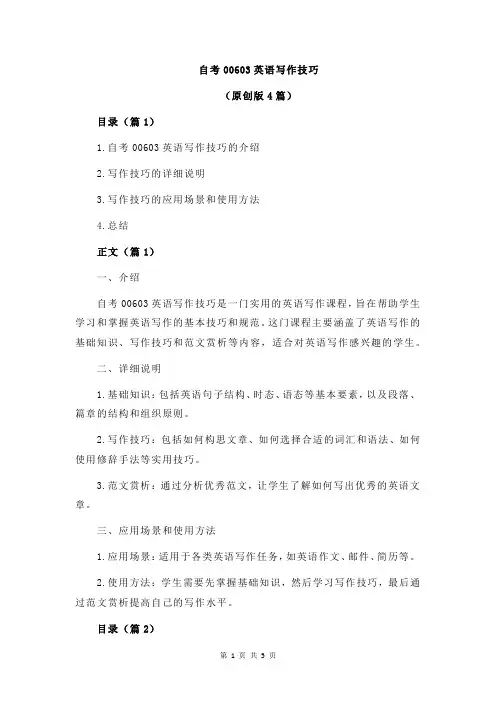
自考00603英语写作技巧(原创版4篇)目录(篇1)1.自考00603英语写作技巧的介绍2.写作技巧的详细说明3.写作技巧的应用场景和使用方法4.总结正文(篇1)一、介绍自考00603英语写作技巧是一门实用的英语写作课程,旨在帮助学生学习和掌握英语写作的基本技巧和规范。
这门课程主要涵盖了英语写作的基础知识、写作技巧和范文赏析等内容,适合对英语写作感兴趣的学生。
二、详细说明1.基础知识:包括英语句子结构、时态、语态等基本要素,以及段落、篇章的结构和组织原则。
2.写作技巧:包括如何构思文章、如何选择合适的词汇和语法、如何使用修辞手法等实用技巧。
3.范文赏析:通过分析优秀范文,让学生了解如何写出优秀的英语文章。
三、应用场景和使用方法1.应用场景:适用于各类英语写作任务,如英语作文、邮件、简历等。
2.使用方法:学生需要先掌握基础知识,然后学习写作技巧,最后通过范文赏析提高自己的写作水平。
目录(篇2)1.自考00603英语写作技巧的简介2.英语写作技巧的核心内容和特点3.英语写作技巧的学习方法及其效果4.英语写作技巧的应用场景和使用技巧5.英语写作技巧的学习价值及其意义正文(篇2)自考00603英语写作技巧是英语学习的重要技能之一,它可以帮助学习者提高英语写作水平,增强语言表达能力。
本文将从核心内容、学习方法和应用场景等方面介绍英语写作技巧。
一、英语写作技巧的核心内容和特点英语写作技巧的核心内容包括语法、拼写、标点符号等方面的基础知识,以及文章结构、语言表达、逻辑推理等方面的写作技巧。
英语写作技巧的特点是注重语言基础知识的运用,强调文章的结构和表达方式,注重逻辑推理和语言表达的准确性。
二、英语写作技巧的学习方法及其效果学习英语写作技巧的方法包括学习基础知识、学习写作技巧、进行写作练习和参考优秀范文。
学习基础知识可以帮助学习者掌握英语语言基础知识,学习写作技巧可以帮助学习者掌握文章结构和语言表达技巧,进行写作练习可以帮助学习者提高写作能力,参考优秀范文可以帮助学习者借鉴优秀写作风格和表达方式。
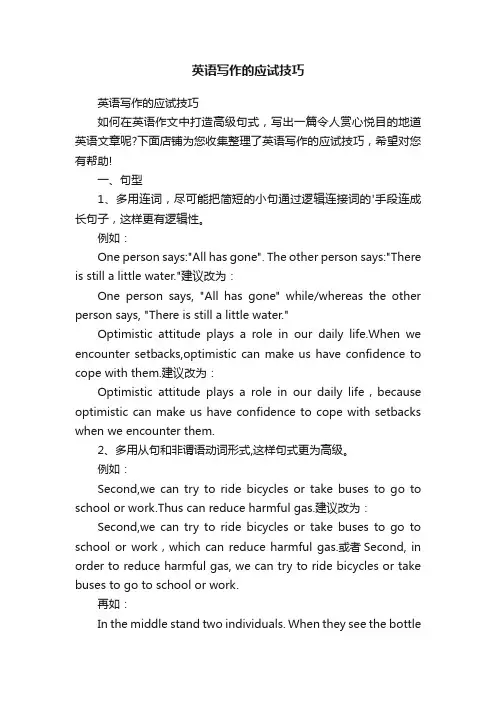
英语写作的应试技巧英语写作的应试技巧如何在英语作文中打造高级句式,写出一篇令人赏心悦目的地道英语文章呢?下面店铺为您收集整理了英语写作的应试技巧,希望对您有帮助!一、句型1、多用连词,尽可能把简短的小句通过逻辑连接词的'手段连成长句子,这样更有逻辑性。
例如:One person says:"All has gone". The other person says:"There is still a little water."建议改为:One person says, "All has gone" while/whereas the other person says, "There is still a little water."Optimistic attitude plays a role in our daily life.When we encounter setbacks,optimistic can make us have confidence to cope with them.建议改为:Optimistic attitude plays a role in our daily life,because optimistic can make us have confidence to cope with setbacks when we encounter them.2、多用从句和非谓语动词形式,这样句式更为高级。
例如:Second,we can try to ride bicycles or take buses to go to school or work.Thus can reduce harmful gas.建议改为:Second,we can try to ride bicycles or take buses to go to school or work,which can reduce harmful gas.或者Second, in order to reduce harmful gas, we can try to ride bicycles or take buses to go to school or work.再如:In the middle stand two individuals. When they see the bottleof water fall down, they react differently. One feels gloomy and the other feels optimistic.建议改为:In the middle stand two individuals, who react differently towards the same phenomenon, with one feeling gloomy while the other optimistic.二、请如何展开论证1、具体展开解释某个词的内涵。
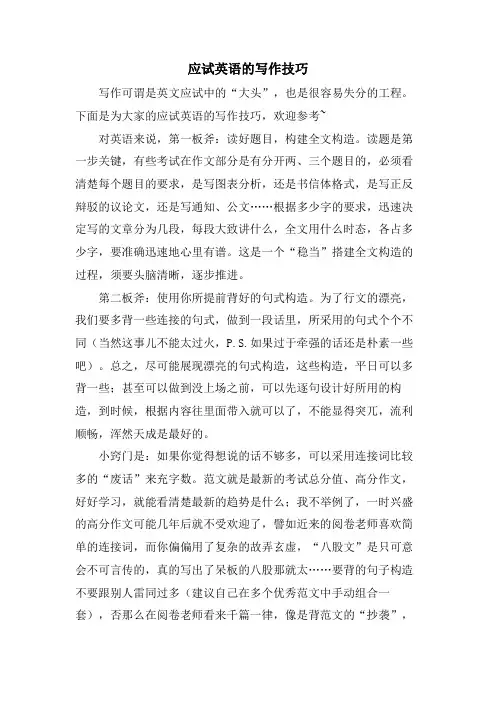
应试英语的写作技巧写作可谓是英文应试中的“大头”,也是很容易失分的工程。
下面是为大家的应试英语的写作技巧,欢迎参考~对英语来说,第一板斧:读好题目,构建全文构造。
读题是第一步关键,有些考试在作文部分是有分开两、三个题目的,必须看清楚每个题目的要求,是写图表分析,还是书信体格式,是写正反辩驳的议论文,还是写通知、公文……根据多少字的要求,迅速决定写的文章分为几段,每段大致讲什么,全文用什么时态,各占多少字,要准确迅速地心里有谱。
这是一个“稳当”搭建全文构造的过程,须要头脑清晰,逐步推进。
第二板斧:使用你所提前背好的句式构造。
为了行文的漂亮,我们要多背一些连接的句式,做到一段话里,所采用的句式个个不同(当然这事儿不能太过火,P.S.如果过于牵强的话还是朴素一些吧)。
总之,尽可能展现漂亮的句式构造,这些构造,平日可以多背一些;甚至可以做到没上场之前,可以先逐句设计好所用的构造,到时候,根据内容往里面带入就可以了,不能显得突兀,流利顺畅,浑然天成是最好的。
小窍门是:如果你觉得想说的话不够多,可以采用连接词比较多的“废话”来充字数。
范文就是最新的考试总分值、高分作文,好好学习,就能看清楚最新的趋势是什么;我不举例了,一时兴盛的高分作文可能几年后就不受欢迎了,譬如近来的阅卷老师喜欢简单的连接词,而你偏偏用了复杂的故弄玄虚,“八股文”是只可意会不可言传的,真的写出了呆板的八股那就太……要背的句子构造不要跟别人雷同过多(建议自己在多个优秀范文中手动组合一套),否那么在阅卷老师看来千篇一律,像是背范文的“抄袭”,这是大忌——如果阅卷老师是外国人,要知道版权是高于一切的,抄袭的嫌疑简直是死罪。
前文的技巧中说了可以背点名人名言助威,但是要用得轻巧、注明出处;如果通篇都将之封为经典,那么老外会认为你缺乏自己的观点,特别是一些过时的名言;不要用太多,引用是需要火候的;不过用一些民间谚语倒是挺讨巧的。
尽可能减少错误的实用,拿不准的就不要做多余的动作,给自己添堵。
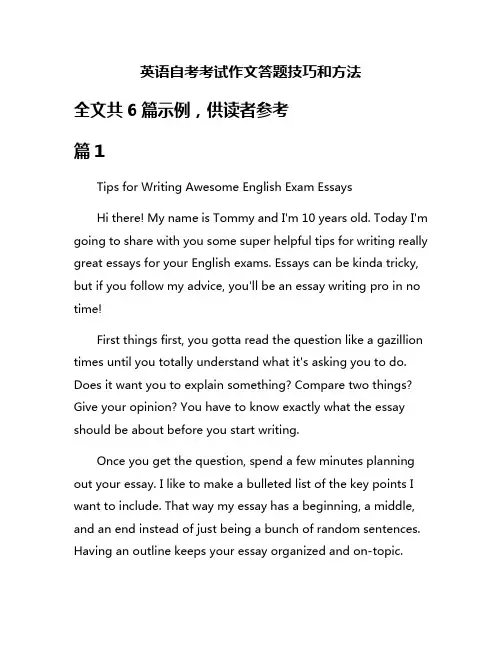
英语自考考试作文答题技巧和方法全文共6篇示例,供读者参考篇1Tips for Writing Awesome English Exam EssaysHi there! My name is Tommy and I'm 10 years old. Today I'm going to share with you some super helpful tips for writing really great essays for your English exams. Essays can be kinda tricky, but if you follow my advice, you'll be an essay writing pro in no time!First things first, you gotta read the question like a gazillion times until you totally understand what it's asking you to do. Does it want you to explain something? Compare two things? Give your opinion? You have to know exactly what the essay should be about before you start writing.Once you get the question, spend a few minutes planning out your essay. I like to make a bulleted list of the key points I want to include. That way my essay has a beginning, a middle, and an end instead of just being a bunch of random sentences. Having an outline keeps your essay organized and on-topic.Now it's time to write that introduction paragraph! This is super important because it needs to grab the reader's attention right away. You can start with an interesting fact, rhetorical question, quote, or even a short anecdote. Then you'll want to clearly state your main idea or thesis for the essay. The intro shows the reader what to expect in the rest of your essay.The body paragraphs are the meat of your essay. Each body paragraph should focus on one main point that supports your thesis. Make sure to include specific details and examples to back up what you're saying. Don't just spit out vague, general statements. The more concrete evidence you can provide, the stronger your essay will be.Use transition words like "first," "additionally," and "in contrast" between body paragraphs to help your writing flow smoothly from one idea to the next. Transition words are like trails of breadcrumbs that guide the reader through your essay.When you get to the conclusion, restate your main points one last time in a clear, concise way. You can also share your final thoughts or call the reader to action. Just don't introduce any new ideas in the conclusion - that's not allowed!Pay close attention to formatting, grammar, and spelling too. Having loads of errors makes your essay look sloppy. Read itover a bunch of times to catch any silly mistakes before you submit it. You can ask a parent, teacher, or friend for a second set of eyes too.One more hot tip - try to use a variety of vocabulary words to make your writing more interesting. But don't just randomly throw in super complicated words that you don't really understand. Stick to words you can use correctly and confidently. The graders can always tell when you're trying too hard.Well, there you have it - my foolproof guide to knocking your English essay exams out of the park! If you follow these tips, you're sure to impress those essay graders. Writing takes practice, but pretty soon essays will be a piece of cake. Now get out there and start writing!篇2Essay Writing Tips for English ExamsHey kids! Are you taking an English exam where you have to write an essay? Don't worry, I'm here to share some awesome tips to help you knock that essay out of the park!First things first, you need to read the essay question very carefully. Like, really carefully. Read it again if you need to. Makesure you understand exactly what the question is asking you to do. Are they asking you to explain something? Persuade the reader? Compare and contrast two things? Knowing what the essay should focus on is super important.Once you get the question, spend a few minutes planning out your essay before you start writing. Having a plan helps you organize your thoughts and ideas so your essay flows smoothly.A good plan has an intro paragraph, body paragraphs, and a conclusion paragraph.The intro paragraph is where you'll state your main idea or thesis for the essay. Think of it like a movie trailer - it should grab the reader's attention and give them a sneak peek at what your essay will be about.Body paragraphs are where you'll support and explain your main idea using examples, facts, reasons, descriptions, etc. Aim for 3-5 body paragraphs. Each one should have its own focus and be about one main point related to your thesis.And the conclusion paragraph is where you'll summarize your key points and restate your main idea. Think of it as bringing everything together in a nice, neat little package.But just having paragraphs isn't enough - you need to connect your thoughts with transition words and phrases. Words like "first," "next," "in addition," "for example," "however," etc. These will help your writing flow smoothly from one idea to the next.Now let's talk about style and tone. For essay writing, you want to sound smart but not too fancy. Use clear language, good grammar, and avoid slang or texting abbreviations. It's also good to vary your sentence structure - don't just use short, choppy sentences. Throw in some longer ones too for a nice rhythm.Oh, and be sure to back up your points and ideas with examples, explanations, facts, quotes from experts or books, etc. The more evidence you provide, the stronger your essay will be.When you finish writing, take a break, then re-read your essay a few times. Check for any spelling, grammar or punctuation errors. See if your ideas are clear and flow logically. Make sure your examples and evidence support your main points well.If there's time, you could even re-write some sections to make them stronger and clearer. Adding more details, explanations or better word choices can really boost your essay score.Remember, practice makes perfect with essays. The more you write, the easier it'll become to plan, organize and express your thoughts clearly. Pretty soon, writing amazing essays will be a piece of cake!So there you have it - my top tips for writing a stellar English essay. Follow this advice and you'll be well on your way to essay superstardom. You got this!篇3Essay Writing Tips for English Self-Study TestsHi there, fellow students! Are you preparing for an English self-study test and feeling a bit nervous about the essay portion? Don't worry; I've got some awesome tips and tricks to help you ace that essay!First things first, let's talk about understanding the prompt or question. This is super important because if you don't fully understand what the prompt is asking, your essay might miss the mark. So, read the prompt carefully, and if you're unsure about anything, ask your teacher or a parent for clarification.Once you've got the prompt down, it's time to start brainstorming ideas. Grab a piece of paper or open a newdocument on your computer, and jot down any thoughts, examples, or personal experiences that relate to the prompt. Don't worry about organizing them just yet; we'll get to that in a bit.Now, let's talk about the structure of your essay. Most essays follow a basic pattern: an introduction, body paragraphs, and a conclusion. The introduction should grab the reader's attention and provide a clear thesis statement (the main idea of your essay). The body paragraphs should each focus on a different point or argument that supports your thesis, with examples and evidence to back them up. Finally, the conclusion should restate your thesis and leave the reader with a lasting impression.Here's an example of what an introduction might look like:"Have you ever wondered why some people seem to have a special talent for something, while others struggle with the same task? This is the concept of natural abilities, and it's a topic that has been debated by experts for years. In this essay, I will explore the idea of natural abilities and discuss whether they truly exist or if they are simply the result of hard work and dedication."See how the introduction grabs the reader's attention with an engaging question, and then clearly states the essay's thesis? That's what you're aiming for!Now, let's move on to the body paragraphs. Each body paragraph should focus on a different point or argument that supports your thesis. For example, if your thesis is about natural abilities, one body paragraph could discuss the role of genetics, another could explore the importance of practice and environment, and a third could examine real-life examples of people with exceptional talents.Here's an example of what a body paragraph might look like:"One argument in favor of natural abilities is the role of genetics. Studies have shown that certain traits and characteristics can be inherited from our parents, such as physical attributes like height or eye color. Some researchers believe that certain cognitive abilities, like mathematical aptitude or musical talent, may also have a genetic component. For instance, a child born to two parents who are both skilled musicians may have a natural inclination toward music from an early age."Notice how the paragraph starts with a clear topic sentence that introduces the main point, and then provides supporting evidence and examples? That's the key to a strong body paragraph.Finally, it's time for the conclusion. This is where you'll wrap up your essay and leave a lasting impression on the reader. Restate your thesis in a slightly different way, and summarize the main points you've made throughout the essay. You can also include a final thought or call to action, if appropriate.Here's an example of what a conclusion might look like:"In conclusion, the debate surrounding natural abilities is a complex one, with compelling arguments on both sides. While genetics may play a role in certain talents and aptitudes, it's clear that hard work, dedication, and the right environment are also crucial factors in developing exceptional skills. Ultimately, the most successful individuals are those who are able to combine their natural inclinations with a strong work ethic and a passion for their chosen field. As we continue to explore this fascinating topic, it's important to keep an open mind and recognize that every person has the potential to achieve greatness, regardless of their perceived natural abilities."See how the conclusion ties everything together and leaves the reader with a thoughtful final impression?Remember, practice makes progress! The more essays you write, the more comfortable you'll become with the process. And don't be afraid to seek feedback from your teacher or a trustedfriend or family member. Their insights can help you identify areas for improvement and take your writing to the next level.Well, that's all from me for now. Good luck with your English self-study test, and may the writing force be with you!篇4Exam Essay Writing Tips for Little LearnersHello, young friends! Are you getting ready to take an English self-study exam? Don't worry, I'm here to share some fun and easy tips to help you ace those essays. Just follow my advice, and you'll be writing like a pro in no time!First things first, let's talk about understanding the question. It's super important to read the essay prompt carefully and make sure you know exactly what the question is asking. Don't be afraid to read it a few times if you need to. It's better to take a little extra time at the start than to write about the wrong thing entirely!Once you've got the question down, it's time to start planning your essay. This is where you get to let your creativity shine! Make a quick outline with an introduction, body paragraphs, and a conclusion. The introduction should grab thereader's attention and give them a sneak peek at what your essay will be about.For the body paragraphs, you'll want to have a clear main idea for each one. Support that main idea with details, examples, and explanations. Don't just tell the reader something – show them with vivid descriptions and carefully chosen words.As you're writing, remember to connect your paragraphs together using transition words like "additionally," "furthermore," and "moreover." This will help your essay flow smoothly from one idea to the next.While you're writing, don't forget about the nuts and bolts of good essay structure. Make sure each paragraph has a clear topic sentence. Use proper grammar, spelling, and punctuation. Vary your sentence structure to keep things interesting. And be sure to follow the formatting instructions, like guidelines for word count or line spacing.If you get stuck, take a break! Step away from your work for a few minutes and do something relaxing, like taking a walk or playing outside. You might be surprised at how a fresh perspective can help those creative juices start flowing again.When you've finished writing, be your own editor. Read through your essay slowly and carefully, looking for any errors or areas that could use improvement. Don't be afraid to make changes – that's what editing is all about! You can add more details, rephrase unclear sentences, or reorganize paragraphs until you're totally happy with how your essay looks.Finally, give yourself a big pat on the back! Writing essays can be challenging, but you worked hard and did your best. Whether this is your first essay or your fiftieth, that's something to feel proud of.I hope these tips have been helpful as you prepare for your English exam. Just remember to read carefully, plan ahead, write clearly and vividly, and edit like a pro. You've got this! Now grab a pencil and get to work – those top-notch essays aren't going to write themselves. Wishing you all the best!篇5Here are some tips and techniques for taking the English self-study exam composition, written in a tone suitable for elementary school students and about 2000 words long:Writing an Awesome Composition for the English ExamHi there, fellow students! Are you getting ready to take the English self-study exam? Don't worry, I've got some really cool tips to help you rock that composition part! Just follow my advice, and you'll be on your way to writing a fantastic essay.First things first, let's talk about understanding the question. You know how important it is to read the instructions carefully, right? Well, for the composition, you'll get a prompt or topic that you need to write about. Make sure you understand what the question is asking you to do. If it says to write a story, don't write an opinion piece instead!Once you've got the question figured out, it's time to start planning your essay. This is like making a roadmap for your writing adventure! Jot down your main ideas and the key points you want to include. You can use a graphic organizer, make an outline, or just scribble down some notes – whatever works best for you.Now, let's talk about the introduction. This is like the doorway into your essay, so you want to make it super inviting! Start with a hook – something interesting or attention-grabbing that will make the reader want to keep reading. You could use a question, a quote, or even a mind-blowing fact! Then, introduceyour topic and give a little preview of what your essay will be about.The body paragraphs are where you'll really dive into the details and juicy stuff. Each paragraph should focus on one main idea or point related to the topic. Start with a topic sentence that tells the reader what that paragraph will be about. Then, use examples, facts, and explanations to support your point. Don't forget to include transitions to smoothly connect your ideas!As you're writing, think about using varied sentence structures and descriptive language to make your essay more interesting and engaging. Instead of saying "The dog was big," you could say "The massive, shaggy dog lumbered across the yard, its paws leaving muddy prints on the freshly cut grass."Remember to stay on topic and provide clear, logical reasoning for your ideas. If you're writing a story, make sure to include details that help the reader visualize the scene and understand the characters' thoughts and feelings.When you're wrapping up, don't just stop abruptly! Instead, write a strong conclusion that summarizes your main points and leaves the reader with something to think about. You could restate your thesis, offer a final thought or recommendation, or even ask a rhetorical question.Finally, don't forget to proofread and edit your work! Check for spelling, grammar, and punctuation errors, and make sure your ideas flow smoothly from one paragraph to the next. It's like giving your essay a final polish before showing it off to the world!And there you have it, my friends! Follow these tips, and you'll be well on your way to writing an awesome composition for the English exam. Just remember to practice, practice, practice, and you'll be a writing pro in no time!Good luck, and happy writing!篇6How to Be a Super Star on the English Self-Study ExamHi everyone! My name is Timmy and I'm 10 years old. I just took the big English self-study exam and I got a really good score! My teacher said I did amazing and she wants me to share my tips with you all on how to ace this test. Get ready to become an English expert!First up, don't freak out! The test might seem really hard at first, but if you prepare properly it's actually not that bad. My biggest tip is to start getting ready way ahead of time. Likemonths before! That's what I did and it helped me feel totally calm instead of stressed.One of the most important things is to read, read, read in English as much as you can. Books, comics, magazines, websites - anything! The more you read, the better you'll understand all the questions on the reading comprehension part of the test. My favorite English books are the Dog Man and Captain Underpants series. They're so funny!Another big part of the test is writing essays and stories. This was the hardest part for me at first. I had to practice a ton by writing lots of different essays and stories about all kinds of topics at home. My teacher would give me feedback to help me improve. You have to learn how to organize your ideas clearly, use proper grammar, spell words right, and all that stuff. It takes lots of work but then it'll become much easier.Vocabulary is huge too. You need to know a bajillion English words to do well. Whenever I came across new words in my reading, I'd write them down and make flashcards. Then my parents would quiz me on them. Flashcards were super helpful for memorizing new vocab. You can also try apps and games to practice new words in a fun way.For the listening comprehension section, my top tip is to watch movies, shows, videos etc. in English as much as you can. It trains your brain to understand different accents and speaking styles. My favorites are animated Disney movies because the language is simpler but still really good practice. I had to take notes while watching shows to get used to it.Don't forget speaking practice too! You can record yourself on your phone reading books or stories out loud, then listen back to hear your pronunciation. Or find a friend to do pretend conversations with. Talking to yourself in a mirror works in a pinch too! Anything to get that mouth moving in English.The grammar questions on the test can be really tricky. I spent a lot of time reviewing all the grammar rules for things like verb tenses, subject-verb agreement, articles, and more. Making charts and keeping a grammar notebook helped me stay organized. It's so boring but you gotta know that stuff cold!On test day, make sure to get a good night's sleep and have a healthy breakfast to fuel your brain. When you get stuck on a question, don't panic! Take some deep breaths and reread it carefully. If you still can't get it, make your best guess and move on. Don't waste too much time on any one thing.Give yourself little treats during the test too. After each section, I let myself eat a few M&Ms from a fun size pack I snuck in. Small rewards kept me going! Staying positive is so important. If you start feeling discouraged, give yourself an encouraging pep talk in your head. You've got this!Those are my biggest tips for conquering this test. It's not easy, but if you put in the hard work preparing, you'll do amazingly. Believe in yourself! Let me know if you have any other questions. Now go get that perfect score!。
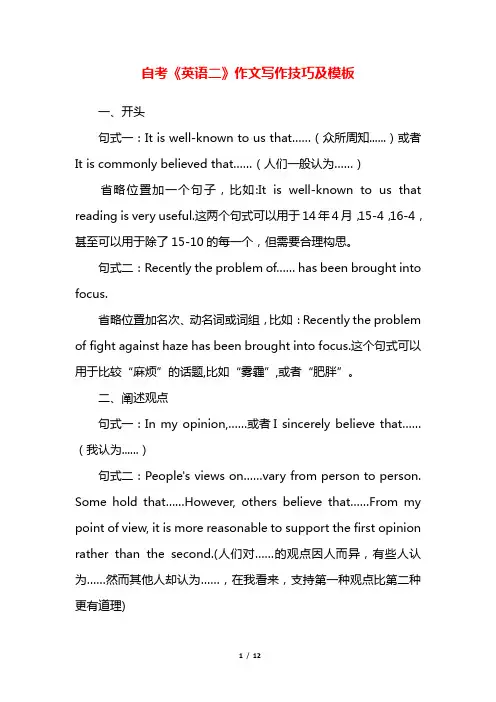
自考《英语二》作文写作技巧及模板一、开头句式一:It is well-known to us that……(众所周知......)或者It is commonly believed that……(人们一般认为……)省略位置加一个句子,比如:It is well-known to us that reading is very useful.这两个句式可以用于14年4月,15-4,16-4,甚至可以用于除了15-10的每一个,但需要合理构思。
句式二:Recently the problem of…… has been brought into focus.省略位置加名次、动名词或词组,比如:Recently the problem of fight against haze has been brought into focus.这个句式可以用于比较“麻烦”的话题,比如“雾霾”,或者“肥胖”。
二、阐述观点句式一:In my opinion,……或者I sincerely believe that……(我认为......)句式二:People's views on……vary from person to person. Some hold that……However, others believe that……From my point of view, it is more reasonable to support the first opinion rather than the second.(人们对……的观点因人而异,有些人认为……然而其他人却认为……,在我看来,支持第一种观点比第二种更有道理)句式三:Some people hold that......,but in my opinion,......(一些人认为......,但在我来看,......)句式四:It may be true that……but it doesn't mean that……(可能……是对的,但这并不意味着……)三、论证观点句式一:For one thing,…… For another thing,……或者On the one hand,……On the other hand……(一方面……另一方面……)或者:First,...... Second,......(第一,...... 第二,......)句式二:By the way,......(顺便说一下......)句式三:Finally, to speak frankly, there is also a more practical reason why I think……(最后,坦率地说,我之所以认为......还有另外一个实际的原因)句式四:The reason why + 句子~~~ is that + 句子(...的原因是...)四、总结号召句式一:No doubt, we must take effective measures, and only in this way cane ......(毫无疑问,我们必须采取有效措施,只有这样我们才能......)句式二:In short, it can be said that……(总而言之,……)句式三:From what has been mentioned above, we can come to the conclusion that……(从上面提到的,我们可以得出结论……)句式四:The best way to solve the troubles is……(解决这些麻烦的办法是……)现象分析型1.现如今,人们对于______这个话题广泛关注。
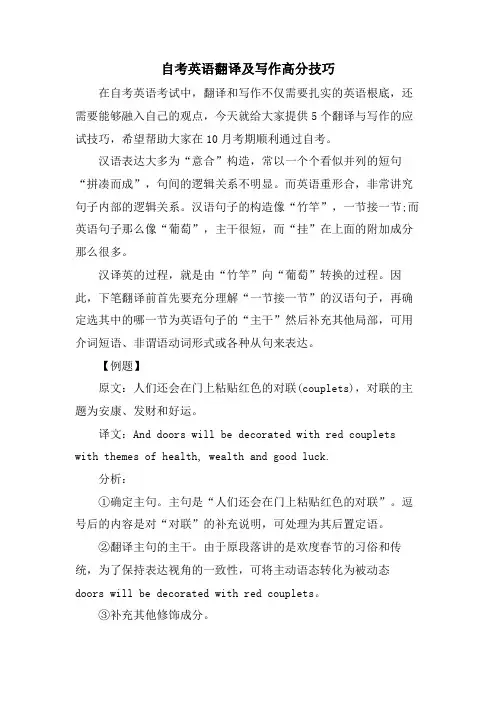
自考英语翻译及写作高分技巧在自考英语考试中,翻译和写作不仅需要扎实的英语根底,还需要能够融入自己的观点,今天就给大家提供5个翻译与写作的应试技巧,希望帮助大家在10月考期顺利通过自考。
汉语表达大多为“意合”构造,常以一个个看似并列的短句“拼凑而成”,句间的逻辑关系不明显。
而英语重形合,非常讲究句子内部的逻辑关系。
汉语句子的构造像“竹竿”,一节接一节;而英语句子那么像“葡萄”,主干很短,而“挂”在上面的附加成分那么很多。
汉译英的过程,就是由“竹竿”向“葡萄”转换的过程。
因此,下笔翻译前首先要充分理解“一节接一节”的汉语句子,再确定选其中的哪一节为英语句子的“主干”然后补充其他局部,可用介词短语、非谓语动词形式或各种从句来表达。
【例题】原文:人们还会在门上粘贴红色的对联(couplets),对联的主题为安康、发财和好运。
译文:And doors will be decorated with red couplets with themes of health, wealth and good luck.分析:①确定主句。
主句是“人们还会在门上粘贴红色的对联”。
逗号后的内容是对“对联”的补充说明,可处理为其后置定语。
②翻译主句的主干。
由于原段落讲的是欢度春节的习俗和传统,为了保持表达视角的一致性,可将主动语态转化为被动态doors will be decorated with red couplets。
③补充其他修饰成分。
【例题】原文:剪纸最常用的颜色是红色,象征安康和兴旺。
译文:The color most frequently used in paper cutting is red, which symbolizes health and prosperity.分析:①确定主句。
主句是“剪纸最常用的颜色是红色”。
“象征安康和兴旺”是对“红色”的补充说明,可处理为定语从句。
②翻译主句的主干“颜色是红色(The color is red)”。
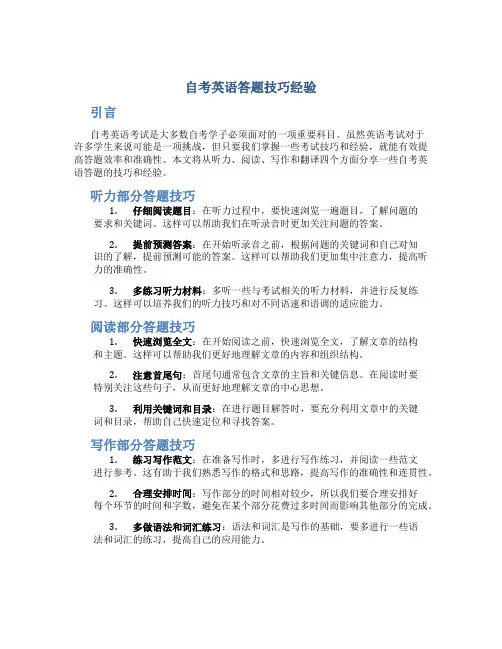
自考英语答题技巧经验引言自考英语考试是大多数自考学子必须面对的一项重要科目。
虽然英语考试对于许多学生来说可能是一项挑战,但只要我们掌握一些考试技巧和经验,就能有效提高答题效率和准确性。
本文将从听力、阅读、写作和翻译四个方面分享一些自考英语答题的技巧和经验。
听力部分答题技巧1.仔细阅读题目:在听力过程中,要快速浏览一遍题目,了解问题的要求和关键词。
这样可以帮助我们在听录音时更加关注问题的答案。
2.提前预测答案:在开始听录音之前,根据问题的关键词和自己对知识的了解,提前预测可能的答案。
这样可以帮助我们更加集中注意力,提高听力的准确性。
3.多练习听力材料:多听一些与考试相关的听力材料,并进行反复练习。
这样可以培养我们的听力技巧和对不同语速和语调的适应能力。
阅读部分答题技巧1.快速浏览全文:在开始阅读之前,快速浏览全文,了解文章的结构和主题。
这样可以帮助我们更好地理解文章的内容和组织结构。
2.注意首尾句:首尾句通常包含文章的主旨和关键信息。
在阅读时要特别关注这些句子,从而更好地理解文章的中心思想。
3.利用关键词和目录:在进行题目解答时,要充分利用文章中的关键词和目录,帮助自己快速定位和寻找答案。
写作部分答题技巧1.练习写作范文:在准备写作时,多进行写作练习,并阅读一些范文进行参考。
这有助于我们熟悉写作的格式和思路,提高写作的准确性和连贯性。
2.合理安排时间:写作部分的时间相对较少,所以我们要合理安排好每个环节的时间和字数,避免在某个部分花费过多时间而影响其他部分的完成。
3.多做语法和词汇练习:语法和词汇是写作的基础,要多进行一些语法和词汇的练习,提高自己的应用能力。
翻译部分答题技巧1.阅读理解原文:在进行翻译之前,要先仔细阅读原文,理解文章的内容和意思。
只有理解了原文,才能更好地进行翻译。
2.注意语法和词序:在翻译时要特别注意语法和词序的准确性。
尽量将原文的语法和句子结构保持一致,避免翻译过程中出现错误。
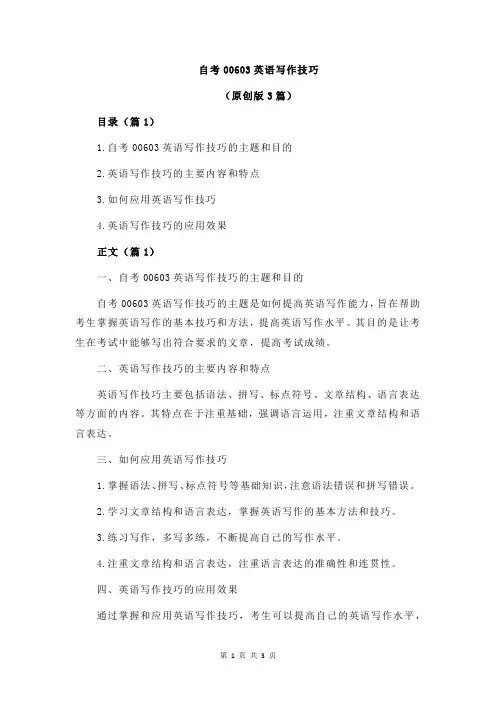
自考00603英语写作技巧(原创版3篇)目录(篇1)1.自考00603英语写作技巧的主题和目的2.英语写作技巧的主要内容和特点3.如何应用英语写作技巧4.英语写作技巧的应用效果正文(篇1)一、自考00603英语写作技巧的主题和目的自考00603英语写作技巧的主题是如何提高英语写作能力,旨在帮助考生掌握英语写作的基本技巧和方法,提高英语写作水平。
其目的是让考生在考试中能够写出符合要求的文章,提高考试成绩。
二、英语写作技巧的主要内容和特点英语写作技巧主要包括语法、拼写、标点符号、文章结构、语言表达等方面的内容。
其特点在于注重基础,强调语言运用,注重文章结构和语言表达。
三、如何应用英语写作技巧1.掌握语法、拼写、标点符号等基础知识,注意语法错误和拼写错误。
2.学习文章结构和语言表达,掌握英语写作的基本方法和技巧。
3.练习写作,多写多练,不断提高自己的写作水平。
4.注重文章结构和语言表达,注重语言表达的准确性和连贯性。
四、英语写作技巧的应用效果通过掌握和应用英语写作技巧,考生可以提高自己的英语写作水平,提高考试成绩。
目录(篇2)1.自考00603英语写作技巧的介绍2.写作技巧的具体内容3.总结正文(篇2)一、自考00603英语写作技巧的介绍自考00603英语写作技巧是一门重要的课程,旨在帮助学生掌握英语写作的基本技能和技巧。
该课程涵盖了英语写作的基本要素,如语法、拼写、标点符号等,以及如何组织文章结构和表达思想。
通过学习这门课程,学生可以掌握英语写作的基本技能,提高写作水平。
二、写作技巧的具体内容1.语法:掌握基本的英语语法知识,包括时态、语态、名词、代词、形容词和副词等。
要仔细检查语法错误,避免出现拼写错误和明显的语法错误。
2.拼写:要仔细检查拼写,确保单词拼写正确。
要注意一些容易混淆的单词,如“their”和“there”、“your”和“you”等。
3.标点符号:要正确使用标点符号,如句号、逗号、分号、冒号等。
英语写作基本方法技巧自考英语写作技巧英语写作基本方法技巧1.构思:构思是写作的起始酝酿阶段,是动笔成文前的准备阶段,也是写作成功的重要阶段。
考虑写作的目的、内容、方法:2.表述:表述是写作具体实施阶段,是将前期的思考外在具体化,将思维转换成文字。
是写作过程的主体阶段。
精妙的构思需用精彩的语言来表达。
3.修改:修改过程是写作的调整完善阶段,是写作的收尾结束阶段:对整个语篇进行反复修改、删节……英语作文的形式有说明文(eposition),议论文(argumentation),叙述文(narration)和描写文(description)四种。
不论写哪一种作文,你都必须首先选词(word),造句(sentence),然后组段(paragraph),成文(position)。
因此,同学们学习用英语写作文,最好不要一开始就忙于追究说明文怎么个写法。
议论文怎么个写法等等,而应该花一定的时间和精力练习写作文的基本功,也就是学习和获取选词、造句、组段、谋篇的知识和能力。
如果你具备了这几方面的知识和能力,再具体了解一下各种表式的作文特点,分别研究一下它们的独特写法,你自然就可以不拘一格地写出各种不同形式和内容的好作文来了。
一、选词词是选句的原料。
选词应该注意以下几点:1.分辨语体。
英语词有书面语体和口语体之分。
2.识别词义。
英语里面有许多同义词,还有一词多义的情况。
选词造句的时候必须注意自己在使用词语的哪一个意思,以及能不能那样用。
3.明确词性。
英语词有一词多性的现象,也有同一个词根派生出几个单词,它们的词义大致相同,但词性各不相同。
4.词义联展与语用习惯。
5.成语的运用。
成语(ldioms)是长期以来惯用的固定词组,它表达完整的意义,必须作为一个整体来记,不可以随心所欲地增一词或减一词。
6.注意拼写。
7.使用词典。
写作文应当勤查词典。
句子是表达意思的最小单位。
按目前中学的实际情况,造句首先要注意语法问题,尤其是:1.主谓齐全。
自考00603英语写作技巧(原创实用版)目录1.自考 00603 英语写作技巧概述2.英语写作的基本步骤3.英语写作技巧的具体方法4.如何提高英语写作能力正文【自考 00603 英语写作技巧概述】自考 00603 英语写作技巧主要针对英语写作的基本步骤和技巧进行讲解,旨在帮助学生掌握英语写作的基本方法,提高写作能力。
本文将从英语写作的基本步骤和技巧的具体方法两个方面进行阐述,并提供一些建议,以帮助学生提高英语写作能力。
【英语写作的基本步骤】英语写作的基本步骤可以分为以下几个步骤:1.确定写作目的和读者:在开始写作之前,要明确写作的目的以及目标读者,以便更好地进行后续的写作。
2.收集信息和素材:根据写作目的和读者,收集相关的信息和素材,为写作做好充分的准备。
3.确定文章结构:根据收集到的信息和素材,确定文章的结构,如引言、正文和结尾等。
4.撰写草稿:根据确定的结构,撰写文章的草稿,对文章的内容和结构进行初步的梳理。
5.修订和润色:对草稿进行多次修订和润色,确保文章的内容和表达达到满意的效果。
【英语写作技巧的具体方法】英语写作技巧的具体方法包括以下几点:1.使用恰当的词汇:在写作过程中,要尽量使用恰当的词汇,以表达准确的思想和观点。
2.保持句子结构的多样性:为了使文章更具有表现力,要尽量保持句子结构的多样性。
3.使用合适的连接词:连接词可以使文章的句子更加连贯,提高文章的表达效果。
4.注意篇章的连贯性:在写作过程中,要注意篇章的连贯性,确保文章的意思能够清晰地传达给读者。
5.掌握段落的起承转合:合理运用段落的起承转合,可以使文章的结构更加清晰,增强文章的表现力。
【如何提高英语写作能力】要提高英语写作能力,可以从以下几个方面进行努力:1.多读:阅读英语文章可以提高自己的英语水平,丰富自己的知识和见识。
2.多写:多进行英语写作练习,可以提高自己的写作能力,积累写作经验。
3.多改:在写作过程中,要不断对自己的作品进行修改和润色,以提高自己的写作水平。
自考英语二作文技巧与方法Self-study English is a widely-used method of learning English, especially for people who have full-time jobs or other responsibilities that make it difficult to attend traditional classroom courses. However, self-study English requires discipline, as this method lacks the structured schedule and accountability provided by traditional classroom courses. To successfully self-study English, it is essential to use effective methods and techniques, and to be consistent in your efforts.The following are some tips and techniques for self-study English:1. Set clear goals: Before starting your self-study English, it's important to define your goals. Ask yourself why you want to learn English and what you hope to achieve.Whether it's for work, travel, or personal enrichment, having clear goals will help you stay motivated and focused.2. Create a study plan: A study plan will help you organize your learning and stay on track. Set aside regular time for studying, and break down your goals into smaller, manageable tasks. For example, you could set a goal oflearning 20 new words each week, or practicing a particular grammar point for 30 minutes every day.3. Utilize online resources: The internet is a great source of English learning materials. There are countless websites, apps, and online courses that offer a wide range of resources, including grammar explanations, vocabulary exercises, listening practice, and interactive activities. Some popular websites for self-study English include Duolingo, BBC Learning English, and EnglishClub.4. Practice listening and speaking: To improve your listening and speaking skills, it's important to exposeyourself to English as much as possible. Watch English-language movies and TV shows, listen to English music and podcasts, and try to have conversations in English whenever possible. You can also use language exchange apps or find a language partner to practice speaking with.5. Read regularly: Reading is a great way to improve your vocabulary and comprehension skills. Try to read a variety of materials, such as novels, newspapers, magazines, and online articles. Pay attention to new words and phrases, and try to infer the meaning of unfamiliar words from context.6. Keep a learning journal: Keeping a journal can help you track your progress and reflect on your learning. Write down new words, phrases, and grammar points that you've learned, and try to use them in context. You can also use your journal to set new goals and make notes on areas that you need to improve.7. Be consistent: Consistency is key to successful self-study. Try to study a little bit every day, rather than cramming a lot of information into one session. Regular practice will help you retain what you've learned and build upon your existing knowledge.In conclusion, self-study English can be a rewarding and effective way to learn the language, but it requires dedication and self-discipline. By setting clear goals, creating a study plan, utilizing online resources, practicing listening and speaking, reading regularly, keeping a learning journal, and being consistent in your efforts, you can make significant progress in your English proficiency. Remember that learning a language is a gradual process, and with perseverance and determination, you can achieve your language learning goals.。
英语自考考试作文答题技巧和方法全文共6篇示例,供读者参考篇1Taking the Big English Test – Study Secrets for KidsHey kids! Are you getting ready to take the big English test for your self-taught course? Tests can be scary, but don't worry –Uncle Claude is here to share his top secret tips for acing the writing section. Follow these tricks and you'll be writing like a pro in no time!First things first, let's talk about why writing is so important on this test. The graders want to see that you can clearly express your thoughts and ideas in English. Good writing shows you really understand the language. It's not just about big vocabulary words, but using grammar correctly and organizing your ideas logically too.Now for the juicy part – my proven study techniques! The number one tip is to practice, practice, practice. The more you write, the better you'll get. It's like building muscles for your brain. Don't wait until right before the test either. Start writing a little bit every single day.What should you write about? Anything and everything! You can keep a daily journal about your life, favorite things, or what you learned in school that day. Or make up totally imaginary stories and adventures. The more creative the better! Describing things in detail will expand your vocabulary too.When it's time to practice for the actual test format, there are two main types of essays you'll need to master: persuasive and narrative writing. Let's take them one by one.Persuasive essays are all about giving your opinion and trying to convince the reader that you're right. The key formula is: an opening statement telling your position, three body paragraphs explaining your reasons, and a conclusion re-stating your main point.For the opening, you want a clear, strong thesis statement right away. Some examples could be: "Homework is a waste of time and should be banned" or "Dogs make the best pets because they are loyal, loving, and fun." See how those get right to the point?Then in the body paragraphs, you'll list your three reasons with examples and evidence supporting each one. Make sure to have a topic sentence at the start of each paragraph stating the main idea. Use lots of great descriptive details and logicalexplanations. Don't forget transition words like "additionally," "furthermore," and "most importantly" to connect your thoughts.Finally, re-wrap it all up in the conclusion by restating your position one last time. You can also mention why this is such an important issue and what might happen if things don't change.The other common assignment is a narrative essay, where you tell a true or fictional story. These are fun because you get to use your creativity and imagination! The basic outline is: an engaging introduction that grabs the reader's attention, body paragraphs describing the key events in a clear sequence, and a conclusion tying it all together.For the introduction, you want to set the scene and give the reader a preview of the exciting story ahead. You could start with a rhetorical question, vivid description, meaningful quote, or placing the reader right in the middle of the action.The body paragraphs are the meat of your narrative where you build suspense, describe the setting/characters, and make the plot unfold step-by-step. Transition words like "suddenly," "meanwhile," and "later that day" will move the story along nicely. Add in lots of juicy details and internal thoughts/feelings to make your writing more engaging.Then for the conclusion, wrap it all up by revealing the resolution or lesson learned. Leave the reader with one final punchy line so they are still thinking about your story after finishing!Those are the basics, but here are some final pro tips for leveling up your essay-writing game:• Use a variety of sentence structures (short, long, complex, compound) to make your writing more interesting.• Sprinkle in literary devices like similes, metaphors, and analogies. Just don't overdo it!• Always proofread your work carefully and check for spelling/grammar errors. You don't want careless mistakes costing you points.• Ask a par ent, teacher, or friend to read your practice essays and provide feedback before the test.So there you have it - all the skills you need to become an A+ student writer! Soak up these tactics like a sponge and wield your pen like a sword against that exam. Just remember to take a few deep breaths, use that amazing imagination of yours, and let those words flow. You've got this! Now get out there and happy writing!篇2考试作文答题技巧和方法大家好!我是小明,今天我要和大家分享一些关于英语自考考试作文答题的技巧和方法。
英语写作考试指南和技巧在英语写作考试中,正确的技巧和方法是提高分数的关键。
本文将为你提供一些宝贵的指导和实用的技巧,帮助你在英语写作考试中取得优异的成绩。
一、准备阶段在正式开始写作之前,有一些准备工作是必不可少的。
首先,确保你对所要写作的主题或话题有充分的理解,并且掌握相关的词汇和句型。
其次,阅读大量的样本文章和范文,以提高语言表达和写作思路。
此外,合理安排时间和分配字数,制定一个清晰的写作计划,避免在考试中无法按时完成作文。
二、组织结构一个清晰的组织结构对于一篇优秀的作文至关重要。
一个有效的方法是采用三段式结构,包括引言、主体段落和结论。
引言部分应该概括主题,并引发读者的兴趣。
主体段落应该围绕主题展开,并且每一段只讨论一个观点或者论据。
结论部分需要总结主要观点,并给出自己的个人观点。
三、使用适当的语言表达在写作中,使用适当的语言表达能够提高作文的质量。
首先,要注意使用正确的语法和拼写,避免出现错误和疏漏。
其次,通过使用丰富的词汇和表达方式,使文章更丰富多样。
此外,适当地使用连接词和过渡词可以使句子与句子、段落与段落之间更加连贯。
四、展开论述在主体段落中,要展开论述并给出具体的例子和论据来支持自己的观点。
合理使用例子可以使文章更具说服力和可信度。
同时,要确保论述的连贯性和逻辑性,避免出现片面和不可靠的观点。
通过引用权威的来源和研究成果,可以增加文章的可信度。
五、适当运用复杂句在写作中,适当运用复杂句可以提高文章的档次。
除了基本的主谓宾句外,可以尝试使用定语从句、状语从句和名词性从句来丰富句子结构。
此外,要注意使用适当的连接词和逻辑词语来连接句子和段落,使文章的逻辑关系更加清晰。
六、注意语言风格和修辞手法语言风格和修辞手法的运用可以使文章更具有吸引力和说服力。
可以尝试使用一些修辞手法,如比喻、拟人、排比和设问等,来增强文章的表达力和感染力。
此外,要注意避免使用太过复杂或夸张的修辞手法,以免影响读者的理解和阅读体验。
浅谈自考英语写作基础的应试技巧
根据《英语写作基础自学考试大纲》的规定,英语写作基础这一课程着重培养考生英语写作的基本技能,重点教授英语写作的最基础内容:句子的组成、段落的写作、概要及应用文写作。
通过本课程的学习,要求考生掌握句子、段落以及应用文最基本的写作理论与技巧,以便写出主题较为突出、内容较为充实完善、语言较为通顺流畅、格式符合要求的短文,为学习本科阶段的英语写作课程打下坚实的基础。
英语写作基础考试题型:《英语写作基础自学考试大纲》的规定“本课程试卷采用的题型主要包括:判断题、改错题、改写题、概要写作、应用文写作等”。
判断题、改错题、改写题等主要考核应考生对句子(The Sentence)和段落(The Paragraph)基本知识点如改写句子包括改写掉尾句(periodic sentence)、平行结构(parallel structure)等和判断主题句(topic sentence)等掌握情况;例如:
Ⅰ.Revise the following sentences according to the requirement
1.The plan began to shake noticeably as soon as it lifted off the runway.(periodic sentence)。